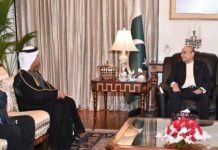President Shavkat Mirziyoyev has now introduced many important integrated measures to put its macro-economy on the right path of sustainability and productive despite expected regional as well as global recession.
Dr Mehmood Ul Hassan Khan
The Republic of Uzbekistan has become “pioneer state” in the Central Asia Region (CAR) to introduce various meaningful socio-economic, administrative and legal measures to launch a comprehensive and effective fight against the Corona-virus (COVID-19). Indeed, national response of Uzbekistan against COVID-19 is “immense” and “decisive” which has now saved its people from any imminent collateral damage.
President Shavkat Mirziyoyev has initiated various short, medium and long term measures to control and develop alternative model for maintaining the national economy and productive channels in safe-zone and approved a 10 trillion sum ($1 billion) package focused on four areas: stemming the spread of the coronavirus, supporting business and employment, expanding social welfare provisions and ensuring the continued functioning of the financial sector.
Right from the beginning of COVID-19 in China the Uzbekistan government was already conducting temperature checks at international borders and airports in January 2020. In February Uzbekistan Airways cancelled direct air travel between Uzbekistan and China and Uzbekistan and South Korea. Afterwards, it banned the export of face masks to ensure ample domestic supply, while sending emergency medical supplies to China. Its comprehensive actions have now prevented any panic throughout.
COVID-19 has now become global epidemic and is affecting millions. A global threat of this enormity demands global solidarity to support the most vulnerable countries as they cope with this unfolding crisis. But inclusive and development oriented policies and people’s friendly measure of Uzbekistan has become a role model in the region and beyond.
Despite its global intensity and regional widespread existence first case of COVID-19 was registered on March 15 in Uzbekistan because of immaculate policies framework, strong political commitment, people’s friendly plans and smooth supplies of medical facilities. Uzbekistan has been put under emergency quarantine on 16 March 2020.
According to Uzbekistan official reports (January 20, 2020), the government of Uzbekistan formed the “Special Republican Commission” to prevent the outbreak or spread of the coronavirus in Uzbekistan which was chaired by the Prime Minister of Uzbekistan.
It was established to take all possible measures to save lives and national economy and enforced the quarantine and introduced measures concerning the following: enforcement of force majeure clause, export-import ban, business support plans, labor relations, and various other national level measures.
A Presidential Decree was adopted to mitigate the negative pandemic effects which empowered the Ministry of Investments and Foreign Trade, international authority and the Chamber of Commerce and Trade, local authority with the mandate to publish an official note regarding force majeure circumstances enforceable during quarantine period. Both the authorities have regulatory discretions and responsible for the issuance of force majeure certificates within one business day upon receiving application from businesses.
Being a “responsive” country, the Republic of Uzbekistan initiated “sensible measures” in the aviation industry and enforced “certain checks” to safeguard the national interests of its people and businesses alike. International air and rail services to all countries were suspended immediately but apply to the carriage of goods remained open.
The government of Uzbekistan has also initiated comprehensive measures in the field of customs. According to the Presidential Decree, starting from 1 April 2020, customs clearance of imported food products will be carried out in an accelerated mode, including by issuing permits before the arrival of goods on the territory of Uzbekistan. The State Customs Committee and other authorized agencies responsible for permits issuance will implement these measures.
To lessen global economic recession and meltdown of regional economic activities the government of Uzbekistan through a Presidential Decree suspended tax audits up to 1 January 2021. The Uzbek Tax authorities will suspend interest payments on businesses struggling to cover the cost of property, land and water resources taxes. In most cases, tax audits will be suspended until January 2021.
Moreover, business corporations have been eligible to receive 6-months tax holidays with exemption for property tax, land tax and water use tax. To give maximum relief the Uzbek tax authorities suspend the accrual of penalties for property tax, land tax and water use tax payable by business entities experiencing temporary difficulties, and will not take measures to forcibly recover tax arrears up to October 2020.
According to Presidential Decree all entities public & private have been instructed to transfer their employees to remote “home-based” work or send to annual leave from March 24, 2020. A corresponding procedure shall be introduced within a week that will specify how employers are able to transfer employees to a remote method of work, flexible working hours or to work at home for the quarantine period. If an employee is sent to quarantine, the employer must pay temporary disability benefits.
The Decree also stipulates that the benefit amounts to 100% of the average employee’s salary if an employee has children under 14 years will be granted. In all other cases the benefit amount varies from 60% to 100% of the average employee’s salary.
According to the Labor Code and the Law on Labor Protection, all employers take extra care about their health and will face disciplinary measures towards employees responsible for violations of requirements of labor protection.
Being prominent regional expert of Uzbekistan and CIS, I highly appreciate the strong political commitment of President Shavkat Mirziyoyev and his deep economic insight to announce the “largest economic” and “financial” bailout package of “Uzbekistan history” after the breakout of COVID-19 a global pandemic with severs regional socio-economic repercussions.
President Shavkat Mirziyoyev has now introduced many important integrated measures to put its macro-economy on the right path of sustainability and productive despite expected regional as well as global recession. The Uzbek President approved a 10 trillion sum ($1 billion) package focused on four areas i.e. controlling the spread of the COVID-19, supporting business and employment, expanding social welfare provisions and ensuring the continued functioning of the financial sector.
Being responsive country of international community, the Republic of Uzbekistan has now been rated the best “National Health System” and qualitative capacity building apparatus in the region. National government horizontal and vertical operationalization and optimal utilities of city and regional functionaries throughout the country has now created diminishing effects in the country and succeeded to safeguard its socio-economic and geopolitical vested interests.
National lockdown, closing of education schools, colleges, universities and vocation centers, introduction of business and investment friendly policies, tax exemptions, incentives, persuasion of alternative model of sustainable economic growth and social unity/harmony, provision of basic necessities of life to elderly and needy people throughout the country, institutionalization of economics of charity, countrywide public awareness campaigns of social distancing, self-checking of body temperature, cancellation of social events, imposition of strict administrative measures at every level, restrictions on aviation industry, and last but not least, legal cover to infected people and employees in Uzbekistan has eradicated the chances of COVID-19. It also shows Uzbek national resilience and high level of responsibilities towards struggling people and weakening humanity.











